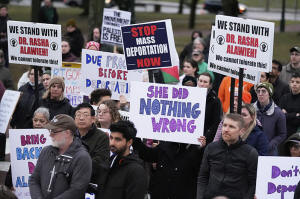Homeland Security says professor deported to Lebanon with US visa
supported Hezbollah leader
[March 18, 2025]
By MICHAEL CASEY, RODRIQUE NGOWI and KATHY McCORMACK
BOSTON (AP) — Homeland Security officials on Monday said that a doctor
from Lebanon who was deported over the weekend despite having a U.S.
visa “openly admitted” to supporting a Hezbollah leader and attending
his funeral.
The department's statement, posted on social media, provides a possible
explanation for Dr. Rasha Alawieh's deportation, which has sparked
widespread alarm, especially after a federal judge ordered that she not
be removed until a hearing could be held. Government lawyers have said
customs officials did not get word until after Alawieh was sent back to
Lebanon.
“A visa is a privilege not a right — glorifying and supporting
terrorists who kill Americans is grounds for visa issuance to be denied.
This is commonsense security,” Homeland Security said in its statement.
It’s the latest deportation of a foreign-born person with a U.S. visa,
after Palestinian activist Mahmoud Khalil, who helped lead protests of
the Gaza war at Columbia University, was arrested and a doctoral
student's visa was revoked. The Trump administration also transferred
hundreds of immigrants to El Salvador even as a federal judge issued an
order temporarily barring the deportations.
Stephanie Marzouk, Alawieh’s lawyer, said she would not stop fighting to
get the 34-year-old doctor back in the U.S., “to see her patients where
she should be.”
Marzouk did not immediately return a request for comment surrounding
Homeland Security’s allegations that Alawieh supported a Hezbollah
leader.

Some court documents are sealed
The Justice Department has also detailed its reasons for deporting
Alawieh in court filings, but a federal judge has sealed those
documents.
News outlets that obtained those records before they were sealed
reported that Alawieh had photos on her phone of Hassan Nasrallah, the
leader of the Lebanese militant group for the past three decades. The
Boston Globe reported she also had pictures of Hezbollah “fighters and
martyrs” on her phone.
“According to Dr. Alawieh, she follows him for his religious and
spiritual teachings and not his politics," the court documents stated.
When asked why she deleted the photos days before arriving in Boston,
Alawieh allegedly told officers: “Because I didn’t want the perception.
But I know I’m not doing anything wrong. I’m not related to anything
politically or militarily.”
Alawieh's deportation
Alawieh was granted the visa on March 11 and arrived at Boston Logan
International Airport on Thursday, according to a complaint filed on her
behalf by a cousin in federal court.
Alawieh, a kidney transplant specialist who previously worked and lived
in Rhode Island, was detained at least 36 hours, the complaint said. She
was to start work at Brown University as an assistant professor of
medicine.
U.S. District Judge Leo Sorokin issued an order Friday that an in-person
hearing be scheduled Monday, with Alawieh brought to court.
On Saturday, the cousin filed a motion saying customs officials
“willfully” disobeyed the order by sending Alawieh back to Lebanon.
Lawyers for the government said in a court filing Monday that U.S.
Customs and Border Protection officers at the Boston airport did not
receive notice of the order until she “had already departed the United
States,” the judge noted. They asked that the petition be dismissed.
Alawieh worked at Brown prior to the issuance of her H1B visa, the
complaint said. It said she has held fellowships and residencies at
three universities in the U.S.
[to top of second column]
|

Protesters rally outside the Rhode Island State House in support of
deported Brown University Dr. Rasha Alawieh, Monday, March 17, 2025,
in Providence, R.I. (AP Photo/Charles Krupa)

A spokesperson for Brown said Alawieh is an employee of Brown
Medicine with a clinical appointment to Brown.
Brown Medicine is a not-for-profit medical practice that is its own
organization and serves its own patients directly. It is affiliated
with Brown University's medical school.
A rally in Rhode Island
On Monday, a handful of Alawieh’s colleagues stood outside Boston’s
federal courthouse to support her.
“She is one of three transplant nephrologists in the entire state of
Rhode Island, which, you know, also serves the parts of
Massachusetts and Connecticut,” said Dr. Susie Hu. “Her absence is
really detrimental to our program.”
Dr. Douglas Shemin, who said he hired Alawieh at Brown Medicine,
called her an “outstanding” clinician, physician and teacher who
eagerly put in long hours without complaining.
Brown Medicine has roughly 300 to 400 patients awaiting kidney
transplants, according to Shemin. Each needs regular evaluations.
More than 100 people gathered in the rain outside the Rhode Island
Statehouse on Monday evening to rally in support of Alawieh, holding
signs reading “Dr. Rasha Has Rights” and “We cannot tolerate this!”
Dr. Paul Morrissey, director of the organ transplantation division
at Brown, said at the rally that he was shocked that Alawieh was
deported and that patients will experience a delay in care because
of it.
“Rasha is a first-class human being — a very talented physician —
and it will be America’s loss if we can’t have her back in Rhode
Island,” he said.
Speaking at the rally, Brown University student Kai Blades called
the deportation part of a broader pattern of political repression.
“We’re here to stand in opposition to deportations, in opposition to
racism and in opposition to the fascist state terror that has been
used not only against our beloved community member Rasha, but others
like Mahmoud Khalil,” Blades said. “We are here to stay. We’re going
to stand up for our community and we’re going to be as loud as
possible when they’re under attack."
Dr. Mindy Saboda, an internal medicine colleague, said Alawieh had
been returning to the U.S. after visiting family in Lebanon for the
first time in six years.

Her daughter, Ada Sobota-Walden, a high school student, called the
deportation upsetting.
“We need to stand up when things like this happen because otherwise
they’ll keep happening,” Sobota-Walden said.
Mahmoud Khalil's lawyers seek his release
Meanwhile, lawyers for Khalil, a Columbia University graduate
student, requested Monday that he be released on bail or returned to
New York from a Louisiana detention facility.
In papers filed in Manhattan federal court, the lawyers wrote that
the treatment of Khalil meant “every noncitizen must wonder whether
they will face retaliation for engaging in speech on issues of
public concern or critical of the U.S. government.” It seemed
designed to “prevent Mr. Khalil — and many others — from speaking in
this country at all,” they added.
All contents © copyright 2025 Associated Press. All rights reserved |